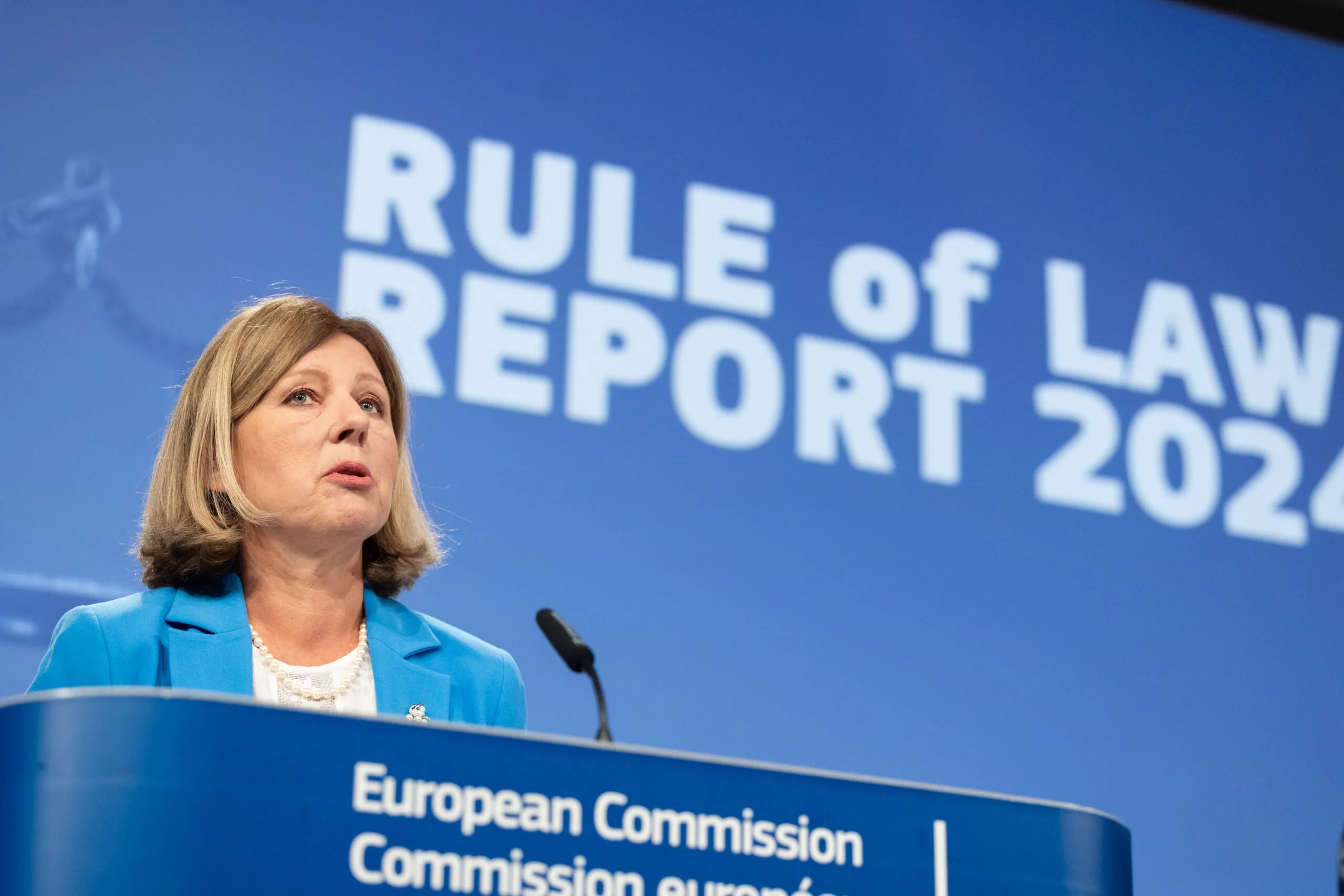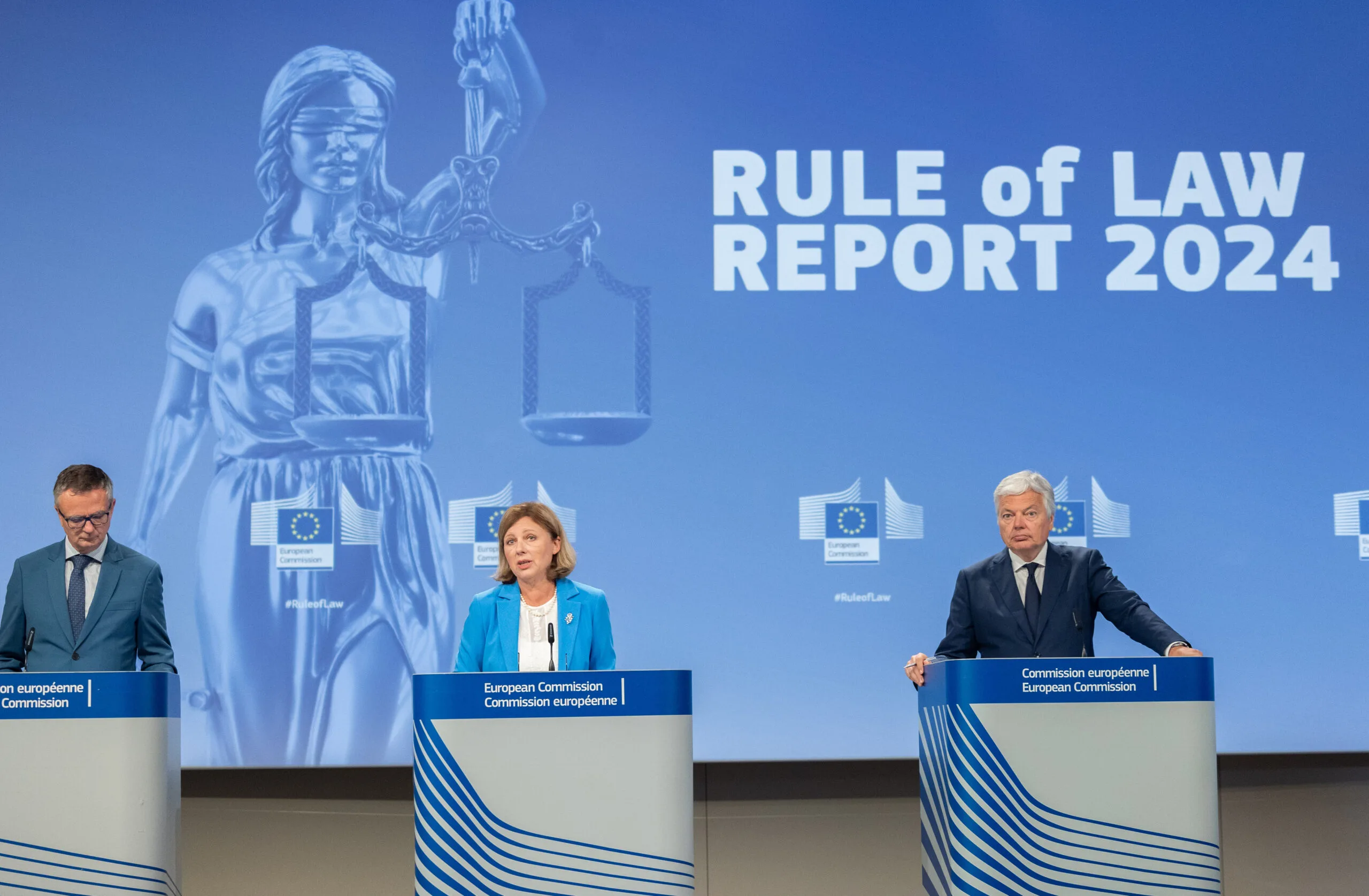Brussels – After controversy over the postponement of closed-match adoption for top jobs of EU institutions, today (July 24), the European Commission has published the annual Rule of Law Report. “To ensure greater visibility,” they cut it short in Brussels. Amid steps forward from 2023 and new recommendations, in the notebook of battered democracies are Italy, Slovakia, and Hungary. But Malta, Greece, Bulgaria, and Spain do not stand out either, while coming out of the black hole is Donald Tusk’s new Poland.
For the first time, in addition to the resilience of democratic principles in the 27 member countries, the EU executive also observed the rule of law situation in North Macedonia, Serbia, Montenegro, Albania, the four countries of the Western Balkans further along the path to EU membership. According to the Commission’s calculations, two-thirds (68 per cent) of the recommendations made in 2023 were addressed “adequately,” in whole or in part.
A positive scenario at the macro level which turns numb when approaching some capitals where “systematic concerns remain” or where the situation has “deteriorated further.” Each has its critical issues, depending on whether one looks at the health of national justice systems, anti-corruption frameworks, the media system, and a range of institutional balances.
Independence of the judiciary and the fight against corruption: Poland and Spain good, Slovakia and Italy worrying

The first parameter is that relating to the judiciary for which several member states “have initiated or carried out important reforms to strengthen its independence,” among which European Commission Vice-President Vera Jourová wanted to mention “two successful examples”—Poland and Spain. In Warsaw, the parliament expressing Tusk’s new pro-European course adopted a law to address concerns about the independence of the National Council of the Judiciary. In Madrid, following a structured dialogue brokered by the European Commission, the main political parties reached an agreement to renew the Council of the Judiciary and start a process to adapt the appointment of its judges, considering European standards.
Far from optimistic is the scenario drawn in Robert Fico’s Slovakia, where “no progress has been made to introduce guarantees for the removal of members of the Judicial Council”, and indeed, three appointments have been revoked before the end of the term. In Bratislava, as well as in Rome and Madrid, there is concern about “the risk that public statements by governments and politicians may affect public confidence in the independence of the judiciary.” Still, on the subject of justice, Giorgia Meloni’s government is among those being watched for the new law repealing the crime of abuse of office and limiting the scope of the crime of influence peddling, which “could have implications for the detection and investigation of fraud and corruption.”
Moreover, proposed changes to the statute of limitations in Italy could reduce the time available to prosecute criminal offences, including corruption cases. The report notes that almost all member states currently have national anti-corruption strategies, “albeit with varying comprehensiveness.” While the Commission points out “some delays” in Malta, the black jersey is still for Slovakia, and the recent criminal law reform passed in Bratislava, which includes lowering penalties for corruption and related offences, shortening the statute of limitations for corruption offences, and abolishing the Special Prosecutor’s Office.
Freedom of the media, alarm in several member states

Vera Jourová , on the left, and Didier Reynders
The situation is alarming in regard to the third pillar of the report: in several member states, the media do not seem to be enjoying good health. Concerns persist about the independence and financial stability of public service broadcasters, transparency of media ownership, the right of access to public documents, and the transparent and fair allocation of state advertising. Again, the most disturbing implications in Slovakia and Italy: the National Socialist executive led by Fico has dissolved the public broadcaster to establish a new one with a more government-issued board. At the same time, attacks on “the effectiveness of the governance system in ensuring RAI’s full independence is a long-standing concern in Italy.”
Even from the standpoint of protecting the journalistic profession against threats and reckless lawsuits, the most exposed seem to be Slovak journalists. However, reform processes “have also stalled” in Cyprus and Malta. So, too, is reform of the libel regime stalled in Italy and Slovakia, where information professionals are often targets of direct attacks by the political class.
It is not surprising at this point that even when looking at the quality of the legislative process, the European Commission chastises Rome and Bratislava for the increasingly considerable use of decree laws and accelerated procedures. The same happens in France and Estonia. To close the picture, Italy is among the four EU countries—with Romania, the Czech Republic, and Malta—that have not yet set up a National Institute for Human Rights.
Hungary black jersey, EU funds remain suspended. Slovakia at risk
Hungary, called by EU Justice Commissioner Didier Reynders “a real systemic rule of law problem,” deserves a separate discussion for all four pillars of the report. That is, while the alarm in Slovakia and Italy is for worsening, Hungary is chronically ill. Compared to 2023, the European Commission has seen no progress made by Budapest on the recommendations made by Brussels: the fight against high-level corruption, reform on lobbying, independence of public service media, and promotion of a safe civic space. That is why, despite the €10 billion in EU funds released in December, the suspension of payments related to the Hungarian Recovery and Resilience Plan persists.
Speaking of European funds at risk of freezing, Jourová left the door open regarding the critical situation in Slovakia. “We are not there yet,” but “the possibility of freezing funds is possible for all member states,” she said. Reynders echoed her: “We will continue to dialogue as long as possible, and eventually, we will see whether to use other instruments” to enforce the rule of law in Bratislava. Forewarned is forearmed.
English version by the Translation Service of Withub





![La sede del Museo di arte orientale a Venezia [foto: Mao]](https://www.eunews.it/wp-content/uploads/2025/04/ca-pesaro-2-120x86.jpg)
![[foto: Vitold Muratov/Wikimedia Commons]](https://www.eunews.it/wp-content/uploads/2025/04/passeggini-120x86.png)